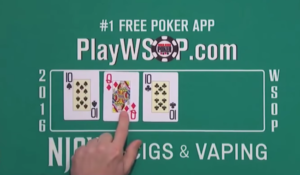How Is Omaha Poker Played

Omaha is an exciting poker variant, and although it bears a striking similarity to Texas Hold’em, it stands in a class of its own.
Official Omaha Poker rules by WSOP.com, learn how to play Omaha Poker and start playing online today! Understand the different types of betting, variations of the game. Omaha Poker is one of the popular games at the World Series of Poker. Omaha is usually played with either pot-limit or limit betting rules. For more on the different betting structures in poker, check out our guide to Poker Betting Rules. Pot Limit Omaha is commonly called “PLO”, and is the second-most popular poker game in the world, behind Texas Hold’em. Omaha is often played high-low split, 8-or-better. The player can use any combination of two hole cards and three board cards for the high hand and another (or the same) combination of two hole.
Once poker players have understood the basic rules of playing Omaha Poker and played a few games for real money, they would want to know the secrets of playing a winning game of Omaha Poker.
Here are 10 tricks to winning at Omaha Poker.
- Know the Rules Omaha players will naturally be disappointed when the read the first secret to playing a winning game of Omaha Poker – know the rules. However, they must understand that it is literally impossible to understand any Omaha Poker strategy until and unless they have thoroughly understood the rules of Omaha Poker at the deepest level.
- Mark the DifferenceMany beginners play a miserable game of Omaha Poker because they do not realize the difference between Hold’em and Omaha. Players of Omaha have to create a strong five-card hand using two hole cards and three community cards, and this is what makes Omaha Poker more challenging than Texas Hold’em.
- Choosing Best Starting HandsA standard deck of 52 playing cards can be used to create 5,277 combinations, provided only four cards are used and suited combinations are not considered. Successful Omaha players understand these combinations very well.
- All Four Cards Are ImportantWhile it is true that players can use only two of their hole cards to create the strongest hand, they must carefully study all the four cards in their starting hand. Thinking of the various combinations that can be created with these four cards will help players understand better their odds of winning.
- Ace Pair Having a pair of Aces in one’s starting hands is something to be happy about. For instance, if players are dealt an Ace of Spades, an Ace of Diamonds, a King of Spades, and a King of Diamonds, they will do very well on the flop. An excellent Omaha Poker strategy would be to play a starting hand with an Ace pair.

Learn the basic Omaha Poker Rules

This video has been provided by online-casinos.com
- Aces Are Not Everything Simultaneously, an ace is not everything and it definitely does not promise the jackpot. While having an Ace in the starting hand is always beneficial, a lot depends on the other cards in the hand. Even if players get an Ace pair, if they have cards such as Five of Clubs and Nine of Hearts with their Ace pair, they will not be able to win. However, if the opponent does not have an Ace in his/her starting hand, the above-mentioned hand can be played. A list of great starting hands with Ace pairs would include AAQQ, AA99, and AAJJ, to mention just a few.
- Kings and Queens Omaha players who are dealt Kings and Queens in their starting hands can also play their hands, provided they have another strong pair. For instance, a King of Diamonds, a King of Spades, a Queen of Diamonds, and a Queen of Spades comprises a great starting hand, but a King of Diamonds, a King of Spades, a Nine of Spades, and a Nine if Diamonds is not really a good hand to play. Players can consider playing starting hands with pairs of cards, suited connectors, flushes, and connectors.
- The Best Can Be the Worst Sometimes players might receive cards that look excellent, but have absolutely no potential of winning. For instance, beginners will jump for joy if they get four cards from the same suit or a three of a kind, but such hands are useless to Omaha players because they can use only two of their hole cards and 3 community cards to create a winning hand. Such hands are, therefore, better folded.
- Identify Worthless Hands Omaha players must understand that they cannot play all starting hands. If they get dealt a hand that has no potential of becoming a winner, they had better fold. Players must learn the art of distinguishing worthless hands from valuable starting hands.
- Best Omaha Starting Hand The best Omaha starting hand can, therefore, be defined as a hand comprising four great cards that can work collaboratively to create a strong poker hand for the player. Players should look for card pairs, complimentary cards, suited cards, connected cards, and even a pair of deuces.
What Is Omaha Poker
In hold'em, players receive two down cards as their personal hand (holecards), after which there is a round of betting. Three board cards are turned simultaneously (called the flop) and another round of betting occurs. The next two board cards are turned one at a time, with a round of betting after each card. The board cards are community cards, and a player can use any five-card combination from among the board and personal cards. A player can even use all of the board cards and no personal cards to form a hand ('play the board'). A dealer button is used. The usual structure is to use two blinds, but it is possible to play the game with one blind, multiple blinds, an ante, or combination of blinds plus an ante.Rounds of Betting
- Opening deal- Each player is dealt two cards face down, which are known as hole cards or pocket cards.
- First round of betting- Starting with the player to the left of the big blind, each player can call the big blind, raise, or fold. The big blind has the option to raise an otherwise unraised pot.
- The flop- The dealer burns a card, and then deals three community cards face up. The first three cards are referred to as the flop, while all of the community cards are collectively called the board.
- Second round of betting- Starting with the player to the left of the dealer button, each player can check or bet. Once a bet has been made, each player can raise, call, or fold.
- The turn- The dealer burns another card, and then adds a fourth card face-up to the community cards. This fourth card is known as the turn card, or fourth street.
- Third round of betting- It follows the same format as the second round, but the size of the bets have usually doubled in limit games.
- The river- The dealer burns another card, and then adds a fifth and final card to the community cards. This fifth card is known as the river card, or fifth street.
- Final round of betting- It follows the same format as the second and third rounds.
- The showdown- Using the best five-card combination of their hole cards and the community cards, the remaining players show their hands, with the bettor or last raiser showing first. The highest five-card hand wins the pot. (In case of a tie, the pot is evenly split among the winning hands.)
What Are The Rules For Omaha Poker
Other Texas Hold'em Poker RulesOmaha Card Game
- These rules deal only with irregularities. SeeButton and Blinduse for rules on that subject.
- If the first or second hole card dealt is exposed, a misdeal results. The dealer retrieves the card, reshuffles, and recuts the cards. If any other holecard is exposed due to a dealer error, the deal continues. The exposed card can not be kept. After completing the hand, the dealer replaces the card with the top card on the deck, and the exposed card is then used for the burncard. If more than one hole card is exposed, this is a misdeal and there must be a redeal.
- If the flop contains too many cards, it must be redealt. (This applies even if it is possible to know which card is the extra one.)
- If the flop needs to be redealt because the cards were prematurely flopped before the betting was complete, or the flop contained too many cards, the board cards are mixed with the remainder of the deck. The burn card remains on the table. After shuffling, the dealer cuts the deck and deals a new flop without burning a card.
See Explanations,discussion #2, for more information on this rule. - If the dealer turns the fourth card on the board before the betting round is complete, the card is taken out of play for that round, even if subsequent players elect to fold. The betting is then completed. The dealer burns and turns what would have been the fifth card in the fourth card's place. After this round of betting, the dealer reshuffles the deck, including the card that was taken out of play, but not including the burn cards or discards. The dealer then cuts the deck and turns the final card without burning a card. If the fifth card is turned up prematurely, the deck is reshuffled and dealt in the same manner.
See Explanations,discussion #2, for more information on this rule. - If the dealer mistakenly deals the first player an extra card (after all players have received their starting hands), the card is returned to the deck and used for the burn card. If the dealer mistakenly deals more than one extra card, it is a misdeal.
- If you are playing the board, you must so declare before you throw your cards away; otherwise you relinquish all claim to the pot.